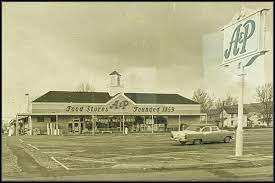Supermarkets, the Cold War, and Hightower
I recommend Supermarket, USA, by Shane Hamilton, a grand book that details the role that supermarkets played in the Cold War. The author calls it the Farm Wars. Not as deadly as the nuclear bomb, but apparently a lot more effective.
In the 50s, the U.S imported a fully functioning supermarket into Tito’s Yugoslavia. It was mightily impressive to the hungry Yugoslavians. They were honestly stunned at the abundance available to American consumers. In the great competition of the first Cold War, it was a battle of hearts and minds and stomachs that really mattered.
David Reisman once suggested sarcastically carpet bombing Russia with jeans and jelly beans in the 50s. Turns out all that was needed was frozen fish sticks.
The American supermarket was “free enterprise” at its most attractive to the bored and neglected consumers of the Communist bloc.
Shane Hamilton explains the history and development of the supermarket and specifically describes the procurement system of the A&P chain store. Following the strategies of A&P from the 1910s through the 1940s, he shows how the firm’s network of purchasing agents came to exert enormous power in the agricultural marketplace. A&P essentially dictated what farmers grew, because growers who wanted to sell to them needed to meet their standards and, in order to meet the chain’s required volume, needed to take on debt to expand and to rely on monoculture.
PHIT might add that the A&P grocery chain also figures prominently in Texas Populist history. Wright Patman battled the chains, and focused on the A&P corporate chain for decades. A&P used its economic might to force out all the mom and pop grocery stores. Some of price competition was efficient management, but some of it was sheer market power. Small towns weren’t happy about that. The system A&P created was copied by Sam Walton and went into overdrive with the Walmart chain.
John Davis of Harvard happily coined the term “agribusiness” in the 50s. And Davis thought agribusiness was good for America. Pesticides and hybrid seeds and monoculture led to consistency and predictability which is what a supermarket wants. It did indeed turn out to be great for the supermarkets but it was devastating for the small farmer.
But, from the perspective of a consumer behind the Iron Curtain, the variety and quantity was truly staggering. However, American critics began questioning the cost.
This is where Hightower comes, who, of course, is the subject of PHIT’s current oral history.
In 1964, with consumer food prices mounting steadily even as farm prices continued to slide, Orville Freeman, Secretary of the USDA, outlined the problems facing America’s farmers, noting that despite their world-beating productivity, many U.S. farmers were struggling to stay in business. Supermarkets seemed a significant part of the problem.
Congress established a commission to investigate the nation’s food system. What emerged was the National Commission on Food Marketing, which spent two years gathering evidence and hearing testimony. Senator George McGovern of South Dakota announced that he was “convinced that chainstore buying practices, contract feeding and vertical integration have been used to depress farm prices.” Agribusiness, in other words, was systematically destroying the family farm.
Ralph Yarborough, Texas Senator in the 60s and another Texas Populist, was concerned about agricultural issues, not only about farmworker issues, but also the impact of agribusiness and huge corporations controlling the food industry. He was involved in those congressional hearings in the mid-60s on the issue.
Congress didn’t do anything.
Hightower was working for Yarborough in those years. When nothing seemed to be happening in the legislative arena, Hightower was asked to run a non-profit research organization, Agricultural Accountability Network, to publicize the issue. This ultimately resulted in the report, Hard Tomatoes, Hard Times, which Shane Hamilton praises.
What the author leaves out is the next step. Hightower took office in Texas in the 80s and developed successful government programs to counter that trend. He was making progress when agribusiness effectively defeated him in 1991.
We at PHIT are recovering that effort as a model for future attempts to take on the agribusiness model of food.
So read Shane Hamilton on how supermarkets won the Cold War. And destroyed the American family farmer.


